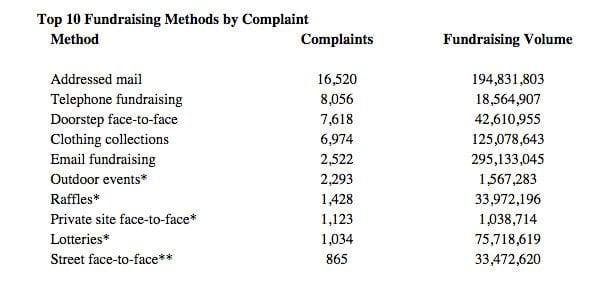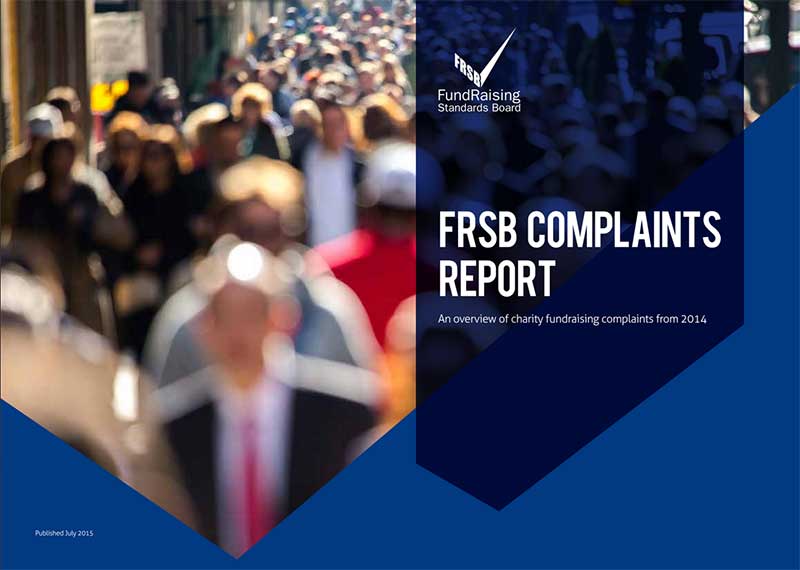Direct marketing and public collections dominated 2014 complaints about fundraising, says FRSB report
Fundraising by direct marketing and public collections generated 86% of the complaints about fundraising recorded during 2014 by member charities of the Fundraising Standards Board, according to its FRSB Complaints Report published this week.
Direct marketing (which consists of direct mail, telephone fundraising, email and SMS) and public collections (Direct Debit, cash, prospect and clothing / household collections) once again generated the most complaints (86%), although there was a 5% reduction in complaints about direct mail (both addressed and unaddressed).
The figures were announced at the Institute of Fundraising’s National Convention in London. They cover 2014, so do not cover the complaints and issues raised following media coverage and comment on the death of Olive Cooke. Nevertheless, common issues do appear, especially around the volume and tone of fundraising communications.
Top 10 fundraising methods by complaint
In 2014 the 1,338 FRSB member charities received 52,389 about their fundraising activities which together raised £5.1 billion in voluntary income.

*Volume for all fundraising is measured by the number of solicitations for funds, except for these starred methods where alternative measures are used as appropriate (ie the volume of outdoor events is measured by the number of participants, raffles by tickets sold and private site fundraising by Direct Debit sign-ups). **The volume measure for street fundraising sign-ups is multiplied by 180 (source: Public Fundraising Regulatory Association) to approximate the number of solicitations made.
It is not, however, simply an issue of volume. Charity advertising has the largest reach of all fundraising methods, yet it resulted in just 2% of complaints.
More complaints but more charities reporting
The total number of complaints filed with FRSB increased by 8% from 48,432 to 52,389. Almost half (48%) of this increase came from charities that reported to the FRSB for the first time in 2014.
However, more charities have joined FRSB and are reporting. In 2014 FRSB’s membership grew by 10%, and the number of members contributing to the complaints report increased by 11%.
Advertisement
Reasons for complaints
Not all charities record the causes for complaint, but where they do the principal concerns do vary depending on the fundraising method.
* Direct mail: the main causes for complaint are poorly addressed communications (25%), frequency of mailings (20%) and tone of the appeal (13%)
* Telephone fundraising: the main causes for complaint are a general dislike of telephone fundraising (34%), the tone of the appeal (30%) and frequency of calls (18%)
* Doorstep fundraising: the most common cause of complaint was the behaviour of fundraisers (42%), and for household clothing collections it was failing to pick up collection bags (64%).
For all these four methods the most common concerns were:
* a general dislike of the method
* the tone of fundraising messages, and
* the frequency of contact.
Most complaints generated by larger charities
The majority of complaints are directed at a small number of major charities. This is not surprising, given that their volume of fundraising activity is necessarily substantially larger than those of smaller charities.
So, although the average number of complaints about fundraising during 2014 is 39 per charity, major charities averaged 500 complaints each.
Small and micro charities typically reported an average of less than one complaint.
Most complaints resolved by charities themselves
The FRSB advises those with a complaint about fundraising to direct it first to the charity concerned. The vast majority of the complaints made in 2014 were resolved by the charities.
During the year, 17 complaints were escalated to stage two of the FRSB’s complaints process, at which the FRSB executive team attempt a resolution, and six adjudications were held.
The final stage in the process is an independent adjudication ruling by the FRSB’s independent Board.
Benchmarking to help reduce complaints
The FRSB takes an active role in helping charities whose complaints exceed those of their peer group to identify and address relevant problem areas. It does so through its benchmarking programme in which charities receive customised benchmarking reports. This year, for the first time, the reports examine not just fundraising methods but the issues that underlie complaints across the top four methods.
Colin Lloyd, Chair of the Fundraising Standards Board said that, given the concerns raised following the tragic death of Olive Cooke, there was a clear need to listen to donors and the wider public and to reflect that feedback within planning future fundraising.
He said:
“The common themes in complaint monitoring of a general dislike of some fundraising methods and the frequency of charity asks must be met with a true commitment by all practitioners to question the number of approaches they make and the ability with which they enable people to opt out of future contact. We welcome the initial steps that the Institute of Fundraising has recently announced to strengthen and review standards in these areas and we look forward to further progress over the coming weeks”.
He acknowledged the “immense challenges” faced by charities as they deal with continued Government funding cuts while demand for their services grows, and the resultant urgent need for funds. He concluded:
“But, there is also an urgent need to ensure that public concerns are addressed and that a balance is struck that meets both the interests of the donor and charity beneficiaries.”
Photo: Ekaterina_Minaeva / Shutterstock.com




